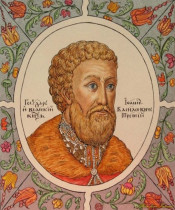
Ivan III illustrated in the Presidential Library’s materials: "He united in his great soul everything that constituted the life of his people"
Prince of Moscow Ivan III Vasilyevich who was named by the descendants the Great and who went down in history as "the gatherer of Russian lands" was born on January 22, 1440.
The Presidential Library provides an opportunity to learn more about rare materials which spotlight the historical era and state activities of Ivan III. These are the works of famous Russian historians such as Nikolai Karamzin History of the Russian State (1819) and Vasily Klyuchevsky Russian History (1902), a large-scale study of the playwright and historian Nikolai Polevoy History of the Russian People (1833), a rare collection of 1878 Laws of the Grand Prince Ivan Vasilievich and the Code of Law of the Tsar and Grand Prince Ivan Vasilyevich with additional decrees and other publications presented on the portal and in the electronic collections of the institution.
“After Peter, Ivan III occupies the first degree among the rulers of Russia; before him all his predecessors were destroyed; none of his successors can compare with him", - this is how Nikolai Polevoy evaluates the historical merits of Ivan Vasilievich, who in March 1462" was co-regent of his father for about ten years, with the knowledge of state affairs, with the experience gained in his youth, in the 22nd year life...became the autocrat of Russia".
Nikolai Karamzin, characterizing the Moscow prince, wrote that he “...did not like impudent courage; waited for an opportunity, chose the time; he did not quickly rush to the goal, but moved towards it with measured steps, fearing equally frivolous ardor and injustice, respecting the general opinion and the rules of the century. Destined by fate to restore the autocracy in Russia, he did not suddenly undertake this great deed and did not consider all means permissible".
When Ivan Vasilyevich ascended the grand-princely throne, “Russia, fragmented into estates, disintegrated into eastern and western, of which the latter was destined to fall under the irresistible influence of a foreign element, Lithuanian-Polish, Russia, enslaved and oppressed by the Tatars, was obviously tormented by civil strife by the princes, danger", - noted in his student work About the reasons for the rise of the Moscow principality (1851) Vladimir Veshnyakov, the future famous economist, honorary member of the Imperial St. Petersburg Academy of Sciences.
Nikolai Polevoy wrote about Prince Ivan's efforts to unite and strengthen Rus’: “He was the first to understand the need to combine a secretive policy with high military courage, internal organization with external relations, readiness for peace in the midst of war and preparations for war in the midst of peace. <…> Through Ivan’s actions, the Golden Sarai Horde disappeared forever. <...> But when the great cause of extermination of the Horde occupied Ivan, he did not leave other great enterprises. These were: the conquest of Perm; complete destruction of Novgorodian liberty; extermination of inheritances".
The historian Alexander Petrushevsky in the publication Stories about the Old Time in Rus’, from the Beginning of the Russian Land to Peter the Great (1906) sums up the military and political activities of the Grand Duke of Moscow.
Ivan III did a lot for the cultural, industrial and civil development of Russia. “When Ivan sat on the tsardom, Moscow was a wooden city; There were very few stone buildings in it, and even they were collapsing...Ivan Vasilyevich summoned knowledgeable foreign masters, built three cathedrals, a palace, Kremlin walls...At the call of the Grand Prince, other idle people came from across the sea: doctors, silver coins, foundry workers. Taking care of the court with the right, the Grand Prince ordered to draw up a Code of Law - a judicial charter, where he indicated who and how to be on trial: for dashing deeds he established to execute the guilty by death”, - continues Alexander Petrushevsky.
“Equally important were Ivan's civil institutions: Orders by which affairs were divided; uniform structure of taxes and fees; internal police in cities; orders in case of fires...", - says Nikolay Polevoy.
“Dying after a long statehood, Ivan Vasilyevich left his heir strong power, a rich treasury and land with far-flung borders. Almost all of the Russian land, except for the regions near Lithuania, has gathered; Tatar captivity, which lasted 250 years without malago, ended irrevocably; After a long illness, the state got on its feet”, - concludes Alexander Petrushevsky.
In his turn, Nikolai Polevoy gives the following assessment of the historical scale of the personality and activities of Ivan III Vasilyevich, the Grand Prince of Moscow: “Ivan was not ahead of either his century or his people; but on the other hand, he united in his great soul everything that constituted the life of his people and his centuries: he was a great, mighty representative of them".

